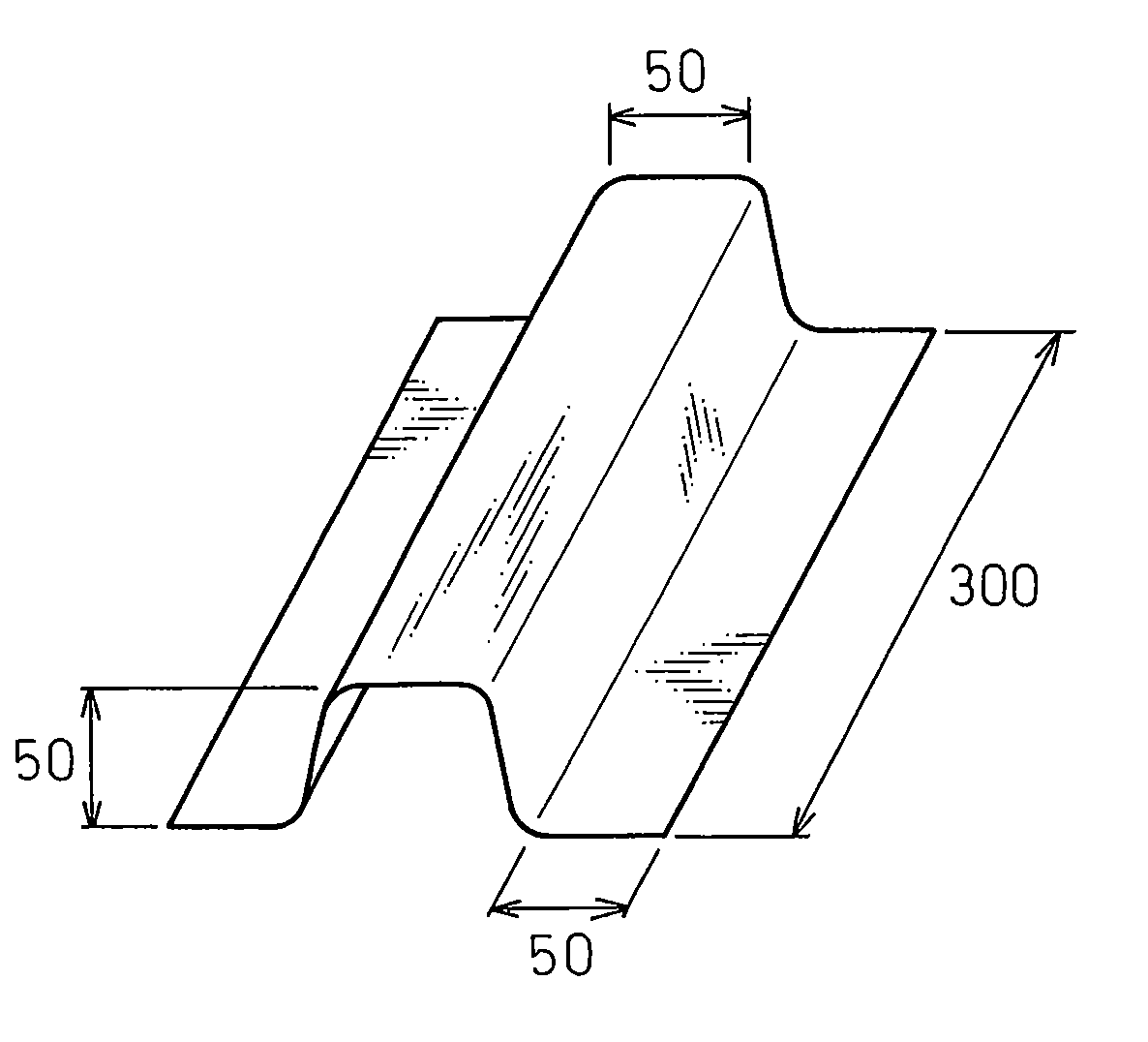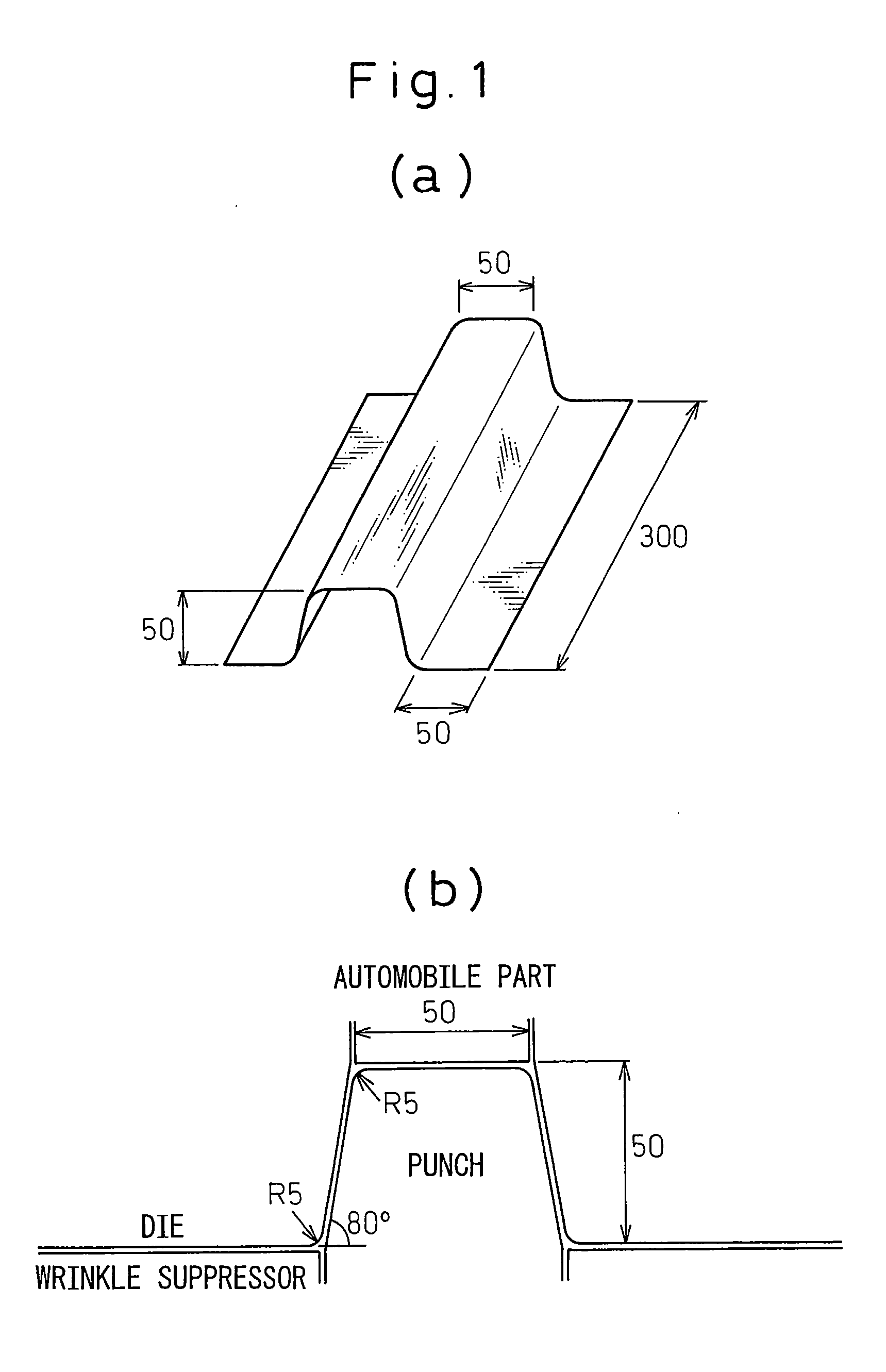Hot pressing method for high strength member using steel sheet and hot pressed parts
a high strength member and hot pressing technology, which is applied in the direction of heat treatment equipment, manufacturing tools, transportation and packaging, etc., can solve the problems of low formability and/or hydrogen embrittlement of high strength steel sheets, and the strength that can be obtained using such techniques may be limited,
- Summary
- Abstract
- Description
- Claims
- Application Information
AI Technical Summary
Benefits of technology
Problems solved by technology
Method used
Image
Examples
example 1
[0032] Cold rolled steel sheets having steel compositions shown in Table 1 and having a thickness of 1.4 mm were heated under various conditions, then formed by a hat-shaped die as shown in FIG. 1. The clearance between the die and the punch can be an important factor when pressing a material. In accordance with exemplary embodiments of the present invention, the clearance was selected to be about 1.1 times the sheet thickness. After forming, 5 mm holes were punched at 10 points in a flange of each part, each hole having a clearance of about 0.5 mm on two sides. After seven days, a 20× power loupe was used to examine the regions around the holes and detect the presence of any microcracks.
[0033] The samples were heated by inserting them into an electric furnace having a controlled atmosphere. The time for raising the temperature to about 900° C. was about 4 minutes, the time to transfer each sample from the furnace to the press was about 10 seconds, and the press start temperature w...
example 2
[0037] Cold rolled steel sheets having steel compositions provided in Table 3 after conventional hot rolling and cold rolling processes, and having sheet thickness of about 1.4 mm, were used as materials for hot dip Al coating. The hot dip Al coating was performed using a nonoxidizing furnace-reduction furnace type line. After plating, a gas wiping method was used to adjust the plating deposition to 80 g / m2 per side. The sheets were then cooled. The plating appearance was good, with no visible unplated areas. The plating material composition was Al-10% Si-2% Fe, and a bath temperature of about 660° C. was used. These values are also provided in Table 9. The Fe present in the bath was essentially an impurity which originated from the plating equipment and / or steel strip.
[0038] The hot dip Al coated steel sheets were heated under various conditions, then formed by the hat-shaped die shown in FIG. 1. The clearance was selected to be about 1.1 times the sheet thickness. After forming, ...
example 3
[0043] Cold rolled steel sheets having steel compositions provided in Table 5 and thicknesses of about 1.4 mm were plated with Zn-based plating materials. The plating composition, deposition quantity and bath temperature are provided in Table 6. These Zn-based plated steel sheets were formed in an exemplary hat-shaped die press as described in Example 1. The samples were examined to determine the presence of any microcracks after forming. Process conditions and observations of micro-cracks for several samples are provided in Table 7.
[0044] The cooling of each formed sample occurred primarily in the die. The average cooling rate from 700° C. to 350° C. was about 20° C. / sec. These samples were measured for cross-sectional hardness after formation as described in Example 1. The hardness value, Hv, of each sample was observed to be in the range of about 410 to 510, and the observed structures were martensitic microstructures. After hot pressing, iron oxide was not observed on the surfa...
PUM
| Property | Measurement | Unit |
|---|---|---|
| Temperature | aaaaa | aaaaa |
| Pressure | aaaaa | aaaaa |
| Temperature | aaaaa | aaaaa |
Abstract
Description
Claims
Application Information
 Login to View More
Login to View More - R&D
- Intellectual Property
- Life Sciences
- Materials
- Tech Scout
- Unparalleled Data Quality
- Higher Quality Content
- 60% Fewer Hallucinations
Browse by: Latest US Patents, China's latest patents, Technical Efficacy Thesaurus, Application Domain, Technology Topic, Popular Technical Reports.
© 2025 PatSnap. All rights reserved.Legal|Privacy policy|Modern Slavery Act Transparency Statement|Sitemap|About US| Contact US: help@patsnap.com



